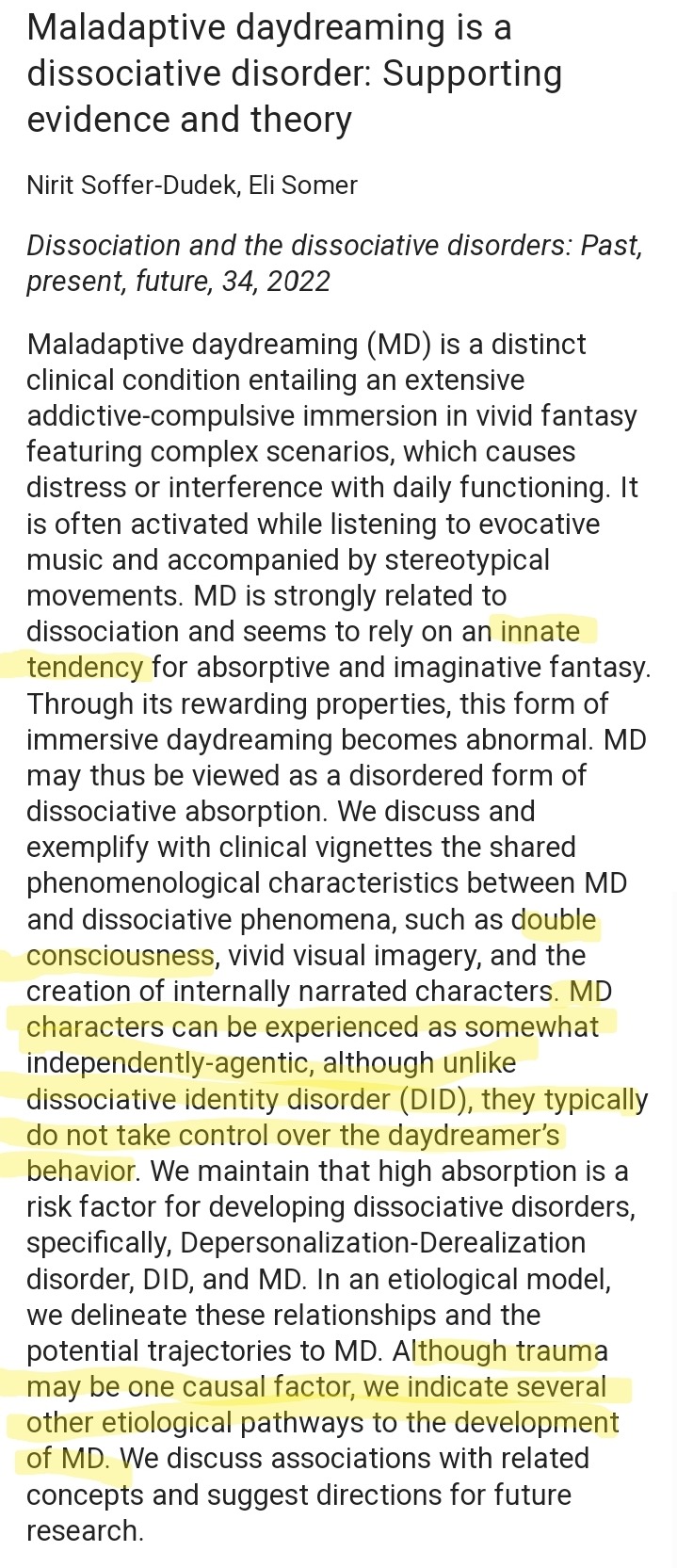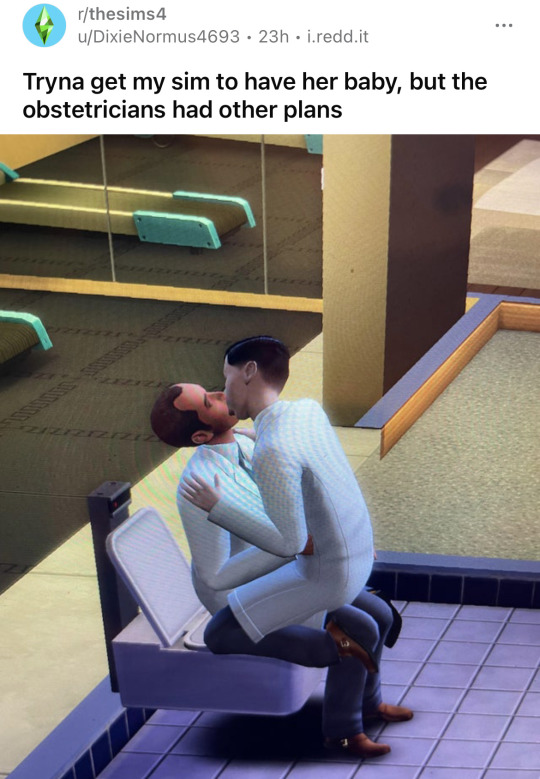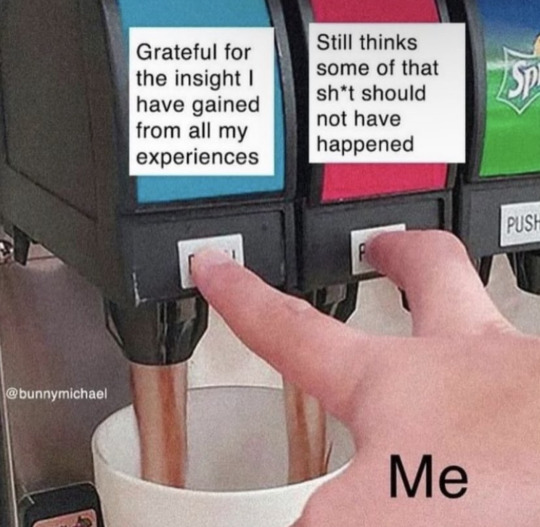Casper -- 25 -- They/He -- System Blog Follows from Peaceful-Phoenix [Links]
Last active 60 minutes ago
Don't wanna be here? Send us removal request.
Text
Common things in DID that no one likes to talk about
- switches that feel like you’re turning into someone else rather than them taking control (non-possessive switching)
- being unable to recognize amnesia until something requires you to remember something you forgot
- staying in the front for weeks at a time
- being unable to communicate with alters internally (this is so common why does everyone act like this is weird?)
- feeling like you don’t have any problems because you feel disconnected from them
- constant denial
- rapid identity, label, and appearance changes
- comorbidities, particularly personality disorders, anxiety disorders, and the schizophrenia spectrum
- autism (there is science pointing towards autistic people being more susceptible to trauma)
- disliking your system
- wanting final fusion
4K notes
·
View notes
Text
most annoying thing about ptsd and trauma and shit is just like... having a rough fuckin therapy sessions or flashbacks and then you just gotta get up in the morning and go to work and pretend you're not still kinda rocked by that still
#tw vent#Ive been finally actually doing like...#therapy for my ptsd specifically#and it's been good but also some sessions just hurt
1 note
·
View note
Text
ive found that partially treated mental illness can sometimes look to uninvolved onlookers like faked mental illness.
145K notes
·
View notes
Text
In the gentlest way I can I do wanna push back on this one just a little. Headspace isn’t the same as real life obviously but I disagree that alters have to be in front to actually experience change and growth. This disorder and related trauma disorders like PTSD play a lot in the subconscious mind. To me it’s not a big leap from that to alters having experiences or changing while not actively in front being observed or experiencing the real outside world.
I may have misunderstood what you were trying to say, in which case I apologize. I don’t personally believe that alters live completely separate lives inside headspace but I do think we should leave space for nuance and different experiences when discussing disorders like this. There’s also a lot of space for different conditions to collide in strange ways. Maladaptive daydreaming is just one I can imagine that might make someone’s inner world feel bigger or more real
I’m more interested in starting a discussion and learning new things than being right so I welcome you (or others) who disagree with me to respond. And apologies again if this came off as more combative than I meant it. I think this could actually be an interesting question to explore
you have one consciousness. alters do not and can not live completely different lives in your headspace. they can't "do" anything in headspace if they're not fronting, co-fronting, or co-conscious.
46 notes
·
View notes
Text
I think more of you guys need to be in mixed origin servers for old fucks only. I think it would probably help. Talk to systems in their late 30s and realize that the origincourse doesn't matter and strictly dividing people into boxes just does not fuckin work
70 notes
·
View notes
Text
system stuff sometimes is like.
yes im an ancient godly power from another realm
and yes im doing our math homework because no one else wants to do it
2K notes
·
View notes
Text
I think this is the perfect way to engage in it! There are some really interesting discussions to be had around certain topics and if nothing else it can be a great way to reconsider how you approach your own system, even if the way you do so doesn’t actually change! People from all over have interesting thoughts worth sharing and talking about!
Apparently we got nominated for the new syscourse brackets going around, which after some hesitation we said sure to cause like... worst case scenario, if it goes toxic we can just ignore it; best case scenario it could be some silly fun
But honestly? We will never say we AREN'T a blog that engages in syscourse because we objectively have in regards to the past and certain topics in the more traditional sense (anti-tulpa terminology really being the only strong stance beyond "cant we just chat about human experiences), but we honestly don't really engage in the argument culture that is surrounding syscourse a lot?
That isn't to say we haven't and that isn't to say XIV's personal blog over there hasn't had its toxic syscourse moments, but the reason we engage in the tag every now and again is cause we follow it cause sometimes there is some good room and genuine topics worth discussing and we really enjoy that exchange of experiences and perspectives.
And so objectively, yeah I guess we do Do syscourse, it's just weird cause we engage with it primarily just to share ways of thinking and more like... philosophical and theoretical discussions than say any real arguments or stances or what not.
Either way, I digress. Just a little small chuckle @ myself honestly.
7 notes
·
View notes
Text
My partner has maladaptive daydreaming (at least I believe so) and what they’ve told me about the characters and worlds does seem equally complex as some of my inner world and analogous though slightly different to alters. I am very interested to see what research in this area continues to find
*Maladaptive Daydreaming is the disordered form of Immersive Daydreaming/Dissociative Absorption (which I believe is the foundation of endogenic plurality experiences), therefore would only really apply to "disordered plurals" that don't have a CDD, similarly not all pwMD would identify as plural the same as most pwCDDs don't use that label
*"Plural Dissociative Disorder" is used here as the best phrase I can come up with to communicate disorders that involve systems of parts/alters/headmates as it wouldn't be a CDD. Although I recognise many do not like this term, everyone hopefully understands what I mean by it
This is the best summary I can find that I feel argues for why it should be included as such:

Arguments against: As a concept it may err ever so slightly too closely to the fantasy model of DID or give credibility to many aspects that the community has worked very hard to move away from.
Overlap: Early reports put comorbidity of MD and DID at only 12.8% but more recent reports have it at more like 40-50%. Prevalence of MD, that is the disordered utilisation of immersive daydreaming/dissociative absorption as a form of escapism, increases dramatically during periods of global unrest, the COVID 19 pandemic saw a marked increase in communities seemingly built around utilising Immersive Daydreaming/Dissociative Absorption such as the reality shifting communities which used guides very very similar to switching and imposition guides shared by the Willo/paragenic communities
Possible explanation for rift in community: many people simply do not have the ability to immersive daydream, and it would seem that the majority of DID research and literature has been written about and focuses on pwDID that don't have this innate ability. A lack of inner world and phobia of the inner experience such as no knowledge and access to parts are commonly described in literature but are at odds with the majority of online presentations of CDDs. It may be that more CDD systems are utilising an immersive daydreaming capability in a more (mostly)positive way thanks to community sharing of experiences, while those who do not have this ability are left dumbfounded by how much the online community doesn't match their experience. Similarly, those with CDDs who can and do utilise this ability would find more shared experiences with the wider plural community including identifying as mixedorigin because immersive daydreaming would be an ability that predates trauma development of a CDD or becoming disordered due to later trauma
Personal experience: I have both DID parts/alters and Immersive Daydreaming headmates. I find this a very useful framework to understand my experience as it allows me to differentiate the needs of both and ensure that one doesn't negatively impact the other. I also believe it's very important to differentiate between them in form and function, while not viewing one as more valid than the other. Treating all ID headmates as alters can quickly become overwhelming if healing is a goal while treating alters as ID headmates can be very damaging and make them feel like they're being exposed and need to retreat further or have protectors and persecutors lash out. I don't think it's wrong to acknowledge that right now there are pwCDDs who mistakenly believe they're endogenic plurals and disordered plurals that mistakenly believe they have CDDs (and potentially therapists misdiagnosing as well).
Psychs: Nijenhuis, Ross, Dell, and Somer all seem to be dancing around this issue from slightly different angles right now, Nijenhuis trying to differentiate purely trauma based pathological dissociative experiences, while Ross has explored a proneness to dissociation, Dell has explored a proneness to hypnotisability, and Somer first identified maladaptive daydreaming whilst also being one of the key researchers into trauma and dissociation over the last few decades. Outside of these there are many psychs that have noticed a marked shift in presentations of patients that supposedly have CDDs resulting in increased research into things like Imitative DID and Malingering/factitious disorder as it relates to DID. Identifying immersive daydreaming as a contributing factor to this change in presentation may help reduce the number of false negatives AND false positives.
I can also very much understand why some might find the particular language of "daydreaming" and "character" to be invalidating towards their headmates, there are cultural connotations to those words. This may largely be due to the research being done into non plural patients but that is clearly changing. There certainly seems to be acknowledgement of the autonomy that can be found when analysing MD through a plural lens though so this language may certainly change as endogenic plurality is brought into the literature more.
72 notes
·
View notes
Text
this is why I view DID as both a disorder/mental illness and a neurodiversity! I know neurodiversity has different meanings to different people but I tend to think of it as something about your brain that is unchangable and outside the norm so autism would also fall under that umbrella
There are definitely many things about DID that are disordered. But I also feel significantly less disordered than I did several years ago. I would even say I've achieved functional multiplicity! But that doesnt change how I ended up with DID or that fact that I still have PTSD and still switch and have misplaced memories sometimes
I dont know if I have a point Im trying to make here but essentially I think this all boils down to BIG MOOD
i am a very medical person when it comes to DID, like i've researched my own condition and been in professional DID therapy for four years now, and i am very passionate about being a person with a disorder/disability, in a grounded sense. i have a lot of frustration toward the internet's treatment of DID as some sort of magical/mystical thing, something that would make a person with DID vastly different from anyone else. DID is just PTSD pushed to its most complex, yaddayadda i won't go on a psychology/science ramble here. but.
at the same time DID directly influences your experience with life and identity since you are a child, a traumatized child at that, and it is an experience i have been living all my life. it is impossible to remove my DID from me, similar (but not exactly the same of course) to how it is impossible to separate me from my autism. my brain developed this way and even if i wanted & achieved "final fusion" i would still always have a DID brain that could split again in the future.
so while i strongly acknowledge that i have a disorder and want to be viewed as such, it's not ALL that. DID influences every aspect of my identity and life and therefore it is empowering to talk about it, make art about it, just be a person with alters. i certainly do not love having trauma and all the bullshit that comes with it but it has been essential to my work-in-progress healing to embrace the parts (no pun intended) of my experience that DON'T all fucking suck. i love disabled joy and part of that for me personally is finding joy with DID. it's like please do not forget this disorder and the shit i went through is horrific but also i am still a person and i experience joy and that joy is inseparable from my DID because my DID is inseparable from everything.
does this make sense. i hope it makes sense. i'm brainfogged as shit right now this might come off as word salad for all i know but i'm doing my best because i'm randomly really emotional about this tonight lol
#Also it feels really nice when I'm just allowed to be myself#DID and all#Being able to tell friends whose in front without it being a whole thing is so nice#For a long time I got in my head about if talking about DID was oversharing#Because it is so heavily tied to trauma (at least for me)#But also sometimes people have trauma and thats normal#And if they can talk about it and themself then so can I#Even if that means gushing about one of my own alters to a friend#Sometimes my little brain people are cute okay?#And sometimes I love them#Most of the time I love them tbh
116 notes
·
View notes
Text
It sucks how two entire months of each year are a trigger for me. Last year I was busy enough at my job that I was just able to work through it and be okay but I haven’t been so lucky this year.
#I try not to be negative on this blog too much#cause this community needs more hope in it I think#but also this shit blows#and I feel like I can’t talk to non traumatized folks about it
1 note
·
View note
Text
"why do i catastrophize so much :(" <- has a trauma disorder from The Catastrophes
226 notes
·
View notes
Text
men only want one thing and it’s to be taken to the cheesecake factory
3K notes
·
View notes



